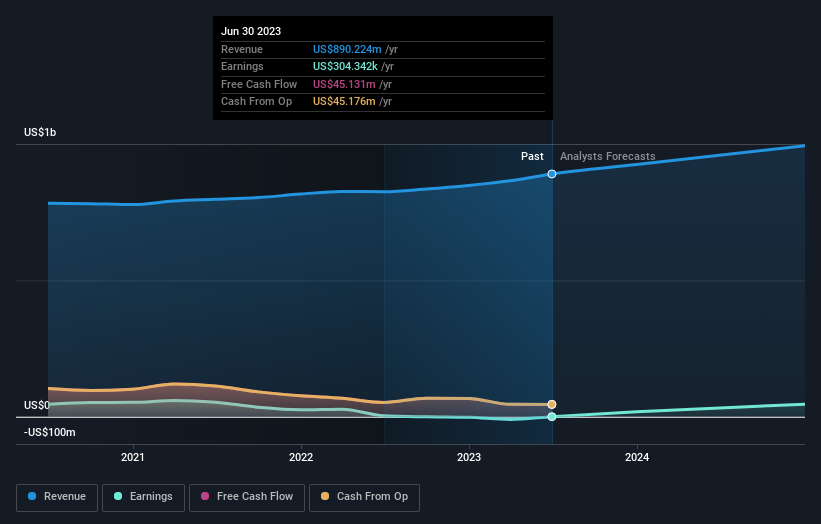Donegal Group Inc.'s (NASDAQ:DGIC.A) top owners are private companies with 51% stake, while 29% is held by institutions
Key Insights
Significant control over Donegal Group by private companies implies that the general public has more power to influence management and governance-related decisions
51% of the company is held by a single shareholder (Donegal Mutual Insurance Company)
To get a sense of who is truly in control of Donegal Group Inc. (NASDAQ:DGIC.A), it is important to understand the ownership structure of the business. And the group that holds the biggest piece of the pie are private companies with 51% ownership. Put another way, the group faces the maximum upside potential (or downside risk).
Meanwhile, institutions make up 29% of the company’s shareholders. Institutions often own shares in more established companies, while it's not unusual to see insiders own a fair bit of smaller companies.
Let's delve deeper into each type of owner of Donegal Group, beginning with the chart below.
Check out our latest analysis for Donegal Group
What Does The Institutional Ownership Tell Us About Donegal Group?
Institutional investors commonly compare their own returns to the returns of a commonly followed index. So they generally do consider buying larger companies that are included in the relevant benchmark index.
As you can see, institutional investors have a fair amount of stake in Donegal Group. This suggests some credibility amongst professional investors. But we can't rely on that fact alone since institutions make bad investments sometimes, just like everyone does. When multiple institutions own a stock, there's always a risk that they are in a 'crowded trade'. When such a trade goes wrong, multiple parties may compete to sell stock fast. This risk is higher in a company without a history of growth. You can see Donegal Group's historic earnings and revenue below, but keep in mind there's always more to the story.
Hedge funds don't have many shares in Donegal Group. Donegal Mutual Insurance Company is currently the company's largest shareholder with 51% of shares outstanding. With such a huge stake in the ownership, we infer that they have significant control of the future of the company. Dimensional Fund Advisors LP is the second largest shareholder owning 5.9% of common stock, and BlackRock, Inc. holds about 4.4% of the company stock.
Researching institutional ownership is a good way to gauge and filter a stock's expected performance. The same can be achieved by studying analyst sentiments. While there is some analyst coverage, the company is probably not widely covered. So it could gain more attention, down the track.
Insider Ownership Of Donegal Group
While the precise definition of an insider can be subjective, almost everyone considers board members to be insiders. The company management answer to the board and the latter should represent the interests of shareholders. Notably, sometimes top-level managers are on the board themselves.
Insider ownership is positive when it signals leadership are thinking like the true owners of the company. However, high insider ownership can also give immense power to a small group within the company. This can be negative in some circumstances.
We can report that insiders do own shares in Donegal Group Inc.. As individuals, the insiders collectively own US$7.5m worth of the US$485m company. This shows at least some alignment. You can click here to see if those insiders have been buying or selling.
General Public Ownership
With a 19% ownership, the general public, mostly comprising of individual investors, have some degree of sway over Donegal Group. While this size of ownership may not be enough to sway a policy decision in their favour, they can still make a collective impact on company policies.
Private Company Ownership
We can see that Private Companies own 51%, of the shares on issue. Private companies may be related parties. Sometimes insiders have an interest in a public company through a holding in a private company, rather than in their own capacity as an individual. While it's hard to draw any broad stroke conclusions, it is worth noting as an area for further research.
Next Steps:
I find it very interesting to look at who exactly owns a company. But to truly gain insight, we need to consider other information, too. Case in point: We've spotted 3 warning signs for Donegal Group you should be aware of.
If you are like me, you may want to think about whether this company will grow or shrink. Luckily, you can check this free report showing analyst forecasts for its future.
NB: Figures in this article are calculated using data from the last twelve months, which refer to the 12-month period ending on the last date of the month the financial statement is dated. This may not be consistent with full year annual report figures.
Have feedback on this article? Concerned about the content? Get in touch with us directly. Alternatively, email editorial-team (at) simplywallst.com.
This article by Simply Wall St is general in nature. We provide commentary based on historical data and analyst forecasts only using an unbiased methodology and our articles are not intended to be financial advice. It does not constitute a recommendation to buy or sell any stock, and does not take account of your objectives, or your financial situation. We aim to bring you long-term focused analysis driven by fundamental data. Note that our analysis may not factor in the latest price-sensitive company announcements or qualitative material. Simply Wall St has no position in any stocks mentioned.


